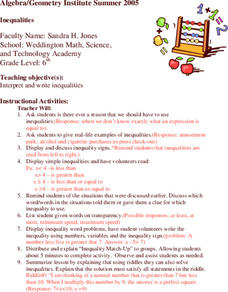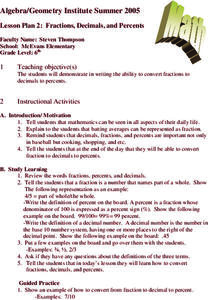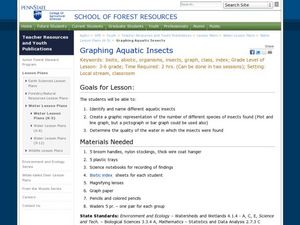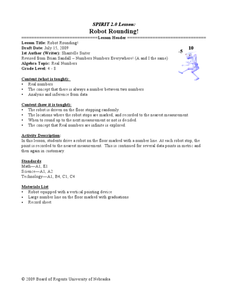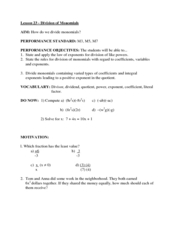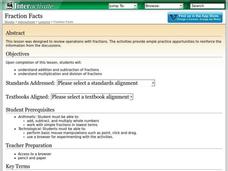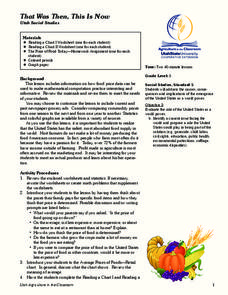Curated OER
Fraction Conversions
Learners convert between fractions, decimals, and percents using money. In this conversions lesson plan, students play with a mock store in class.
Curated OER
Adding and Multiplying Decimals
Students review the process needed to add and multiply decimals. They work in pairs and use grocery store sale papers to plan a meal for 20 people. They multiply the price of the items to calculate a total cost.
Curated OER
Inequalities
Sixth graders explore the concept of inequalities and how to solve them in the realm of integers. The instructor would benefit from using a number line and reviewing integers before using this instructional activity.
Curated OER
Don’t Sit Under the Apple Tree…You Might Become Famous
Students explore Newton's laws using CEENBoTs. In this physics lesson plan, students collect data and create tables and graphs. They calculate speed, acceleration and forces using mathematical formulas.
Curated OER
Fraction Reaction
Students review how to solve problems with fractions. In groups, they participate in a card game in which they identify the fraction and its equivalent. They also complete a worksheet related to fractions and have a partner check their...
Curated OER
Fractions, Decimals, and Percents
Sixth graders engage in a lesson that explores the conversion process of fractions, decimals, and percents in relationship to their values to each other. Students demonstrate how to convert numbers interchangeably between fractions,...
Curated OER
Fencing a Garden
Students use their knowledge of area and perimeter to design a fictitious garden fence. In this area and perimeter lesson, students design a garden fence with a set perimeter. They are given the cost per foot of the fence, and determine...
Curated OER
Graphing Aquatic Insects
Learners identify aquatic insects. In this organism instructional activity, students locate aquatic insects near a local waterway and collect them. Learners graph the amount of insects that they collected.
Curated OER
Cool Tools to Solve Challenging Word Problems
Learners solve math word problems. In this cool tools instructional activity, students are introduced to the K-N-W-S method. Learners work in groups and complete a worksheet using this method of learning.
Curated OER
Stained Glass Polygons
Students follow directions to make a stained glass window design of regular and irregular polygons with specific geometric elements. In this geometry lesson plan, students also analyze other classmate's designs.
Curated OER
Robot Rounding!
Students collect data on a robot and relate the behavior to prove there is an infinite minute set of numbers. In this algebra lesson, students verify that there is always a number between two numbers. They analyze and make inference...
Curated OER
Representing the Unknown
Student use mental math to solve linear equations. In this algebra lesson, students solve one and two steps equations. They write expressions using variables to identify the unknown.
Curated OER
Division of Monomials
Students relate the division of monomials to multiplication. In this division of monomials lesson, students divide monomials by factoring and dividing common factors from the originals. They check their answers by multiplication. As each...
EngageNY
Divisibility Tests for 3 and 9
Who knew the sum of a number's digits gives such interesting information? The 18th installment of a 21-part module has scholars investigate division by three and nine. After looking at several examples, they develop divisibility tests...
Curated OER
Prime and Composite Numbers
Sixth graders investigate the concept of prime and composite numbers. They use a review of multiplication to help explain factoring. Students are taught the definition of a prime and composite number and then practice independently.
Curated OER
Figuring Elapsed Time
Students tell time. In this elapsed time instructional activity, students review how to tell time to five minutes. Students solve problems where they must determine the elapsed time.
Curated OER
Associative Property of Multiplication
Students solve math problems. For this multiplication lesson, students review the multiplication facts for factors 0 through 10. Students learn and practice the associative property of multiplication.
Curated OER
Using a Multiplication Table to Divide
Pupils use a multiplication table to divide. In this multiplication table lesson plan, students use the answers in the multiplication table to find its factors. Pupils find the product of 5 and 6.
Houghton Mifflin Harcourt
Introducing the Concept: Adding and Subtracting With Negative Integers
A basic narrative is outlined for teaching a lesson on the addition and subtraction of integers. Using a number line, you can demonstrate how to find the sum of a positive and negative integer. On the right side of the page are links to...
Curated OER
Batchelder News Channel Data Mix Up!
Students look at data in graphs with missing labels and use what they know about graphs to label the topics, titles, and axes of the graph. In this graph lesson plan, students pretend they are news reporters and have to fix their stories!
Curated OER
The Meaning of Algebraic Expressions
Learners define equations and expressions. In this algebra instructional activity, students review important vocabulary words to do with equations and solving problems. They simplify equations and expressions using addition, subtraction,...
Curated OER
Fraction Facts
Students explore the concept of fractions. In this fractions lesson, students perform basic operations such as addition and subtraction with fractions. Students play a game on the computer called 'Fraction Four' that gives students...
Curated OER
That was Then, This is Now
Students compare and contrast data charts and statistics for food prices of now and in the past. In this food prices lesson plan, students answer short answer questions and calculate computations.
Curated OER
Measure the Earth's Circumference
Learners explore geometry by conducting a science experiment. In this circumference measurement lesson, students review the Greek geographer Eratosthenes who first discovered the circumference of our planet. Learners utilize...




